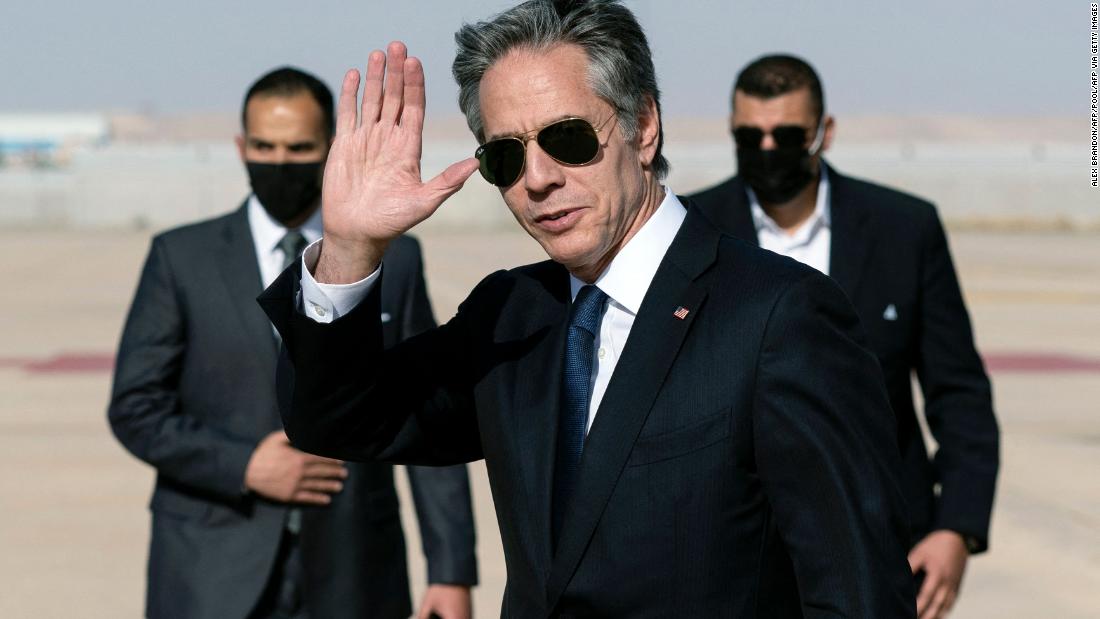
Blinken and Dr. Tedros Adhanom Ghebreyesus met in Kuwait almost a week after China announced that it would not participate in the second phase of the WHO's investigations into the virus' origins after the health organization included the possibility that the virus escaped from a lab in Wuhan, China.
"Secretary Blinken affirmed U.S. support for the WHO's plans to conduct additional studies into the COVID-19 origins, including in the People's Republic of China, to better understand the current pandemic and prevent future ones," State Department spokesperson Ned Price said in a statement. Blinken "stressed the need for the next phase to be timely, evidence-based, transparent, expert-led, and free from interference," Price said.
'Against science'
The coronavirus is one of several areas of stress between China and the US. As the two seek to recalibrate and balance an increasingly fractious relationship, the Biden administration has worked to approach Beijing with a united front of allies.
On Wednesday, Blinken also "emphasized the importance of the international community coming together on this matter of critical concern and reiterated our support for a multilateral approach to global health security more broadly," the statement continued.
For its part, Beijing said last week it would not participate in a second investigation into the pandemic's origins and has refuted accusations that it denied WHO researchers access to locations or data during the global health organization's first probe. Zeng Yixin, deputy head of the National Health Commission, told a July 22 press conference in Beijing he had been "surprised" to see the lab leak listed as a research objective under the second phase of the investigation.
"In some aspects, the WHO's plan for next phase of investigation of the coronavirus origin doesn't respect common sense, and it's against science. It's impossible for us to accept such a plan," he said.
Most scientists who study coronaviruses and who have investigated the origins of the pandemic say the evidence strongly supports a natural origin, a thesis that current intelligence reinforces, sources have told CNN. That does not preclude the possibility that the virus was the result of an accidental leak from the Wuhan Institute of Virology, where coronavirus research was being conducted on bats, though many scientists familiar with the research say such a leak is unlikely.
Administration officials and scientists stress that understanding how the virus began is a key piece of the puzzle as global health experts try to slow and eventually halt a scourge that, according to Johns Hopkins University, has sickened more than 195 million people and claimed more than four million lives worldwide and now threatens to claim even more as it develops dangerous new mutations.
The WHO released an initial report from its investigation into the origins of Covid-19 in March, in which it determined that the virus probably originated in an animal before spreading to human beings around December 2019.
But the same month WHO released that report, a member of the WHO team who helped oversee the original investigation said the theory that the virus had leaked from a lab in Wuhan did "not receive the same depth of attention and work" as the hypothesis that it jumped to people from an animal.
A growing number of Western nations began to question the thoroughness of the original report, in part because Beijing had refused to cooperate with the probe.
In May, President Joe Biden announced he was directing the US intelligence community to conduct a 90-day review into the origins of the pandemic after a US intelligence report found several researchers at China's Wuhan Institute of Virology fell ill in November 2019 and had to be hospitalized.
"I have asked for areas of further inquiry that may be required, including specific questions for China," Biden said at the time, saying that he had called on the US National Labs and other agencies to help. Biden noted at the time that Western observers had yet to be granted access to key Chinese laboratories to determine "whether it was an experiment gone awry."
In June, leaders at the G7 summit in Cornwall, England, issued a call for a new study into the virus' origins. And on July 15, Tedros joined those calls for China to cooperate more fully with a new investigation, saying the first had been hampered by a lack of raw data on the early days of the pandemic.
"We ask China to be transparent and open and to cooperate," he told a news conference. "We owe it to the millions who suffered and the millions who died to know what happened."
At Wednesday's meeting in Kuwait, Blinken and Tedros also discussed ways to work together "to continue reforming and strengthening the WHO, while also building greater global pandemic preparedness and response capacity across the board," Price said.
Biden announced on his first day in office that he was retracting the Trump administration's May decision to withdraw from the WHO.
"who" - Google News
July 29, 2021 at 05:42AM
https://ift.tt/3BQ0gc0
Blinken meets with WHO director to reaffirm US support for second probe into Covid outbreak - CNN
"who" - Google News
https://ift.tt/36dvnyn
https://ift.tt/35spnC7
Bagikan Berita Ini














0 Response to "Blinken meets with WHO director to reaffirm US support for second probe into Covid outbreak - CNN"
Post a Comment